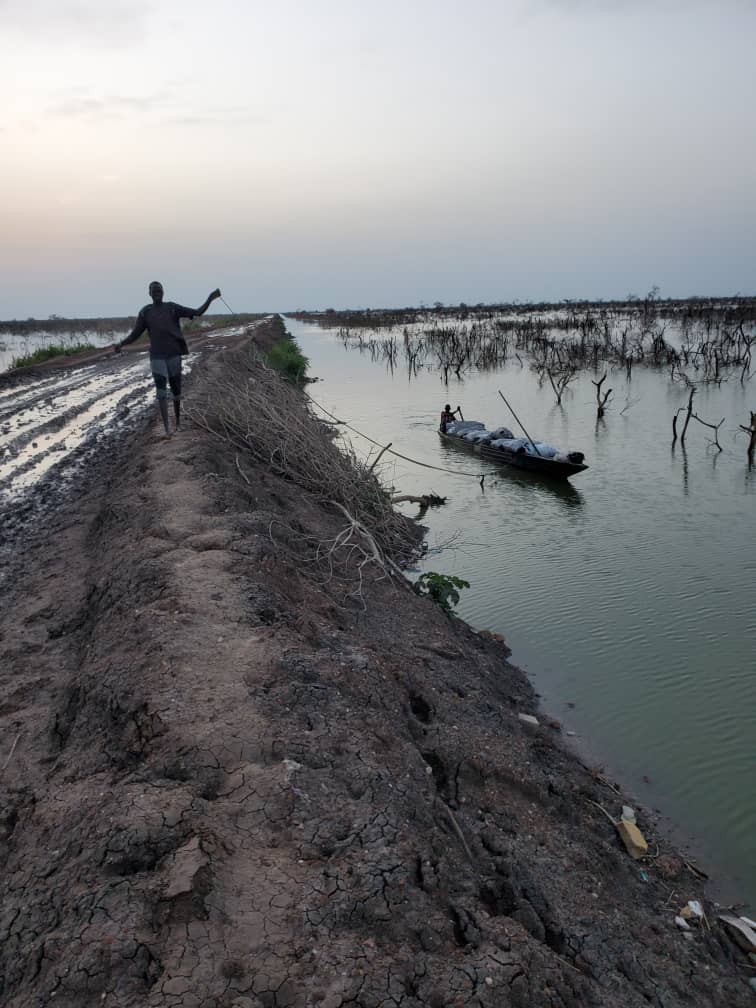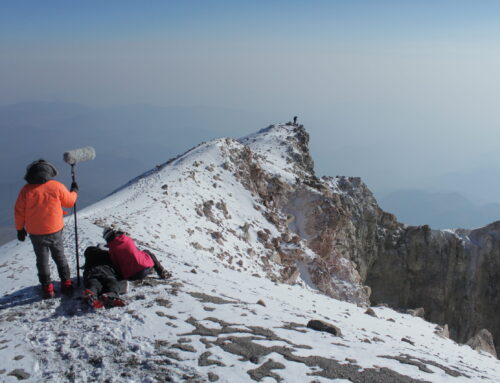
Traders outside Mayom, Unity State, 2024. Photo by Mawal Marko Gatkuoth.
In the last twenty years, a rapid succession of crises—floods, droughts, rebellions, and national wars in Sudan and South Sudan—have been capitalised on by commercial investors working with both state-allied and private security partners. These corporate interests have built a cheap and mobile waged labor force through layers of rents, taxes, fees and debts. This growing cash labor market securitises oilfields, farms, mines, businesses and compounds that stretch along the disputed national border between Sudan and South Sudan. In the center of this long border lies the oilfield state of Unity in South Sudan, which borders the Nuba Mountains in Sudan. Both regions now fall under a patchwork of armed authorities’ zones of control. These authorities remain relatively fixed despite the spreading frontiers of the war in Sudan since 2023 and the fragmentation of the South Sudan state, because they are rooted in military-commercial empires built since the wars of the 1990s.
To understand the dynamics of this military-commercial economy and the class stratification and labor relationships it generates, Marko and Manal spent a month travelling across this landscape in sustained conversations with its workers. This short intervention makes three arguments. First, we should understand pollution and (increasingly regular) climate disasters as part of the coercive arsenal of governing authorities in post-statist neoliberal borderlands like this one. Second, these authorities are interested in creating “labor traps” within their toxic geographies to capture cheap or free productive and social-reproductive labor (following Spiegel et al. 2023; Scott and Rye 2025). Third, creating this captive depressed market strengthens opportunities for the regional and international extraction of corporate profit.
Environmental coercion
In the last six years, climate change-related flooding events and extractive pollution have accelerated on the borderland between Sudan and South Sudan. Massive flooding has become an annual disaster, especially in the Rubkona area and across refugee camps in Ruweng in 2021, and across the whole region in 2022. The borders and Nuba mountains suffered a deeply destructive drought in 2023 followed almost immediately by massive flooding across the whole region as well as widespread locust destruction in the mountains; 2024 brought another year of widespread flooding. Repeated oil pipeline disruptions have created localized pumping and storage crises. This oil pollution, as well as cyanide waste from gold mining in the Nuba Mountains, has been carried further afield by increasingly wide flooding.
Public authorities use the region’s repeated environmental disasters as a tool in local government—in mobilizing communities against each other—and in economic control, driving people into refugee camps, towns and commercial farms for safety and job-seeking. This is a common logic of regional war tactics: like the Sudan Government’s bombardment of the Nuba Mountains from 2013, the South Sudan Government’s wars in Unity State in 2014-2017 and 2019-2022 aimed at destroying the socio-economic base of perceived opposition areas through the wholesale destruction of farms and herds. Climate change-induced floodings (controlled in part by decisions over where dykes and levees are built) are a cheaper method of population control than full military operations, but achieve the same ends: impoverishing perceived opposition strongholds and creating new displaced settlements of desperate workers.
Labor traps
War, floods, droughts, pollution and inflation are all economically productive for governing authorities because they create useful immobility, trapping people into urbanization, encampment, and market dependency. Governing authorities and their commercial partners have benefited from the urbanization of a large number of desperate people seeking rented homes and any work going. The region’s international and internal borders are not technically “closed,” but fees and taxes levied by a plethora of military and civil authorities at checkpoints are both immediate local authority revenues and create high costs of movement, making better-paid migrant work options north and south too expensive to access, especially for women.
This labor entrapment has provided significant opportunities for regional investors to build an extractive commercial economy based on rent monopolies and cheap labor costs. Members of the military-political classes running government and army systems in this region—many since the 1990s—have invested in long-term warehousing and domestic rental units, commercial agricultural and extractives projects, private transport and security companies. On the other hand, repeated losses from conflict and environmental disasters have undermined middle-class and working-class abilities to reconstruct and re-invest. This has generated the possibility of monopolies alongside rapid vertical class stratification, where a much smaller class of wealthy entrepreneurs compete to consolidate corporate and administrative controls that allow them to invest, selectively tax, suppress wages, and control population movements (see also Pattenden 2024 and Martiniello 2019, both on Uganda). This has created a market for very low-paid piecework and self-employed market supply work, including providing transport and food services. Human labor is now cheaper than renting transport: in the 2023 dry season, some Mayom traders hired women to carry goods to Rubkona, over at least 80 kilometres, instead of renting a truck.
Extraction and corporate profit
Ordinary workers are fully aware of these dynamics of class construction and exploitation. In our research, we gathered songs—written predominantly by women, including by famous female songwriters—that explicitly set out the analysis we presented above. Esteemed songwriter Elizabeth Nyaduiy Bidiet articulated the sense of broken vertical relationships and the abrogation of wealthy responsibilities in crises in a recent song: “the daughter of Mr. Mading doesn’t bother with us, because people greet only those with big buttocks [Neer ke ni ram mi te ke wuoth: only those with big buttocks are greeted or respected]. Then I ask: where will those with no buttocks go to?”
These conditions are dangerous for people to live and work in, with few rights and little recourse. This captive market, which continues to provide opportunities for enclosure and rent extraction, provides its monopoly capitalists with high returns at low cost. Securitisation of these zones of profit—the oilfields, farms, mines, markets, compounds, and transport systems that stretch across the borderland—is made cheap through the instrumentalization of climate change patterns and securitised corridors of (im)mobility.
References
Martiniello, Giuliano. 2019. “Social Conflict and Agrarian Change in Uganda’s Countryside.” Journal of Agrarian Change 19 (3): 550–68. .
Pattenden, Jonathan. 2024. “Exploitation, Patriarchy and Petty Commodity Production: Class, Gender and Neocolonialism in Rural Eastern Uganda.” Review of African Political Economy 51 (May): 16–41.
Scott, Sam, and Johan Fredrik Rye. 2025. “The Mobility–Immobility Dynamic and the ‘Fixing’ of Migrants’ Labour Power.” Critical Sociology 51 (1): 71–86.
Spiegel, Samuel J., Lameck Kachena, and Juliet Gudhlanga. 2023. “Climate Disasters, Altered Migration and Pandemic Shocks: (Im)Mobilities and Interrelated Struggles in a Border Region.” Mobilities 18 (2): 328–47.
Acknowledgements
Our research assistants were Linda Madeng Gatduel, Nyaphean Phan Char, Bisal Hassan, Razaz Juma and Gisma Yousif.
Nicki Kindersley is senior lecturer in African history at Cardiff University and a contemporary historian of migration and work, focused on South Sudan and its borderlands. She holds an early-career fellowship from the Independent Social Research Foundation for 2024-2025 and is a visiting lecturer at the University of Juba, South Sudan.
Mawal Marko Gatkuoth is a social researcher. He has worked with the Rift Valley Institute since 2019 on several projects and is co-author of ‘South Sudan: Youth, violence and livelihoods’ (2021).
Manal Abdulaziz Mudir is a researcher in peace studies. She has worked with the Rift Valley Institute under the XCEPT cross-border local research network since 2024.
Cite as: Kindersley, Nicki, Mawal Marko Gatkuoth and Manal Abdulaziz Mudir. 2025. “Disaster Capitalism in South Sudan”. In “Bordering and the War on Migration”, edited by Anna Simone Reumert, Wendy Vogt, and Charlie Piot, American Ethnologist website, 23 September 2025. [https://americanethnologist.org/online-content/disaster-capitalism-in-south-sudan-by-nicki-kindersley-mawal-marko-and-manal-abdulaziz-mudir/]
This piece was edited by American Ethnological Society Digital Content Editor Kathryn E. Goldfarb (kathryn.goldfarb@colorado.edu).




